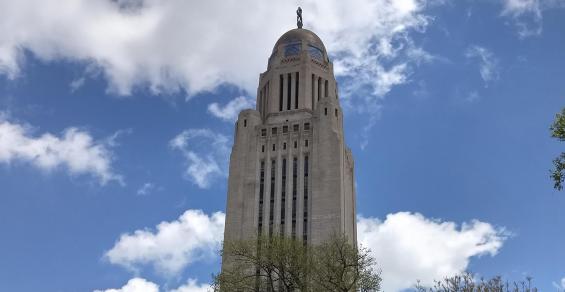The second session of the 107th Nebraska Legislature came to a close with Gov. Pete Ricketts’ “Sine Die” address to the Unicameral — his last such address as governor — on the final day of the session April 20.
In his address, Ricketts made special note of LB873, which he said offers the largest tax relief package in state history, delivering $3.4 billion in additional tax relief through the tax year 2027. The session also allocated $1.04 billion in American Rescue Plan Act federal assistance.
In addition, legislative approval of the Perkins County Canal project and other water-related construction projects — including approval of a new lake to be built between Lincoln and Omaha and recreational and water development at state parks and state recreation areas — were among those projects specifically cited by Ricketts in his address.
Thirteen state senators met for the last time as state legislators, with the departure of 11 senators to term limits and two others who have decided not to seek reelection.
Here are nine takeaways and a few important examples of rural legislation gleaned from the actions of the recently completed legislative session:
1. Big tax relief. Ricketts signed LB873 into law on April 13, providing tax relief to farmers and ranchers over the next five years with an estimated $886 million in property tax relief alone. This bill passed the Unicameral on final reading on a vote of 43-0-6.
The bill changes provisions to phase down business income rates from the current 7.75% to 5.84% by 2027. It phases down the highest individual income tax rate from 6.84% to 5.84% over the next five years, and accelerates the phaseout of taxes on Social Security income by the tax year 2025.
“Wow,” said Ricketts in his address to the Unicameral. “What fantastic work you have done in this short 60-day session. Historic work. Work that will have generational impact.”
“Working together, we’ve been able to provide $4 billion in tax relief through the eight years of my administration,” he said. “And this tax relief bill gives 12 times more relief than any tax relief bill in any previous administration, so it is truly historic.”
2. Controlled spending. Staying within budget is one reason for Nebraska’s success, Ricketts said. “You have crafted a budget that serves the people of Nebraska, but also conserves our budget,” he told senators.
The growth of the state budget during the eight years of Ricketts’ administration has been at an average annual rate of 2.8%. “That keeps it below the threshold of 3%,” Ricketts added. “Managing our budget has been vital to bringing tax relief.” He noted that Nebraska ranks high nationally in its pandemic response and in maintaining the lowest unemployment rate in the country and in state history.
“When you all steward this state well, we see those results,” he said. “There are more Nebraskans employed, nearly 20,000 more, than pre-pandemic.” Because of the controlled budget and higher-than-forecasted state revenue collections, tax relief and investments in public safety and water have been made possible, he added.
3. Water. The Perkins County Canal project, which would divert additional South Platte River non-irrigation season flows into Nebraska, is one method that the state can capture water that is quickly being allocated in Colorado, supporters of LB1015 say.
The law authorizes Nebraska to build a canal off the South Platte River, and Ricketts noted in his address how important this project is to protect the state’s water interests, including for drinking water, irrigation, power generation and to protect the natural environment.
LB1023, signed by Ricketts on April 20, includes $200 million in funding aimed at building a new marina at Lake McConaughy, a major marina expansion at Lewis and Clark State Recreation Area, and a new event center and lodge at Niobrara State Park. The bill also begins funding for the construction of a proposed 3,600-acre lake off the Platte River between Lincoln and Omaha. “These investments will have generational impacts and help us attract and retain people in our state,” Ricketts said.
4. Rural development tax credits. LB1261 increases the amount of tax credits available each year under the Nebraska Advantage Rural Development Act, from $1 million to $10 million, beginning in 2022. This bill offers new tax incentives for livestock modernization or expansion projects, and includes elements of LB596, which makes retailers who sell and dispense ethanol-blended gasoline formulated with a percentage of at least 15% by volume of ethanol eligible for a refundable state income tax credit.
5. New agricultural innovation facility. As part of the mid-biennium budget package signed by Ricketts, $25 million was set aside for an agricultural innovation facility to serve as companion to the proposed USDA National Center for Precision, Resilient and Regenerative Agriculture, with both facilities being planned for Nebraska Innovation Campus in Lincoln.
The $25 million is the public half of a private-public partnership that includes another $25 million via private funds. The first floor of the new facility will serve as support space for entrepreneurs, early state startups and established companies, connecting them with federal and university-based researchers. The other three floors will offer space for state-of-the-art innovation maker laboratories and high-bay spaces that bring together students and researchers.
6. Local meat processing. As part of appropriations in federal dollars from the American Rescue Plan Act, LB755 was passed under LB1014, providing $10 million for the Independent Processor Assistance Program that was passed in 2021. This program offers financial assistance for buildings, equipment, technology and workforce training for small and medium-sized meat processors.
7. Resilient soils and water quality. LB925 was adopted with the goal of accelerating the use of best management practices for healthy soils and to protect and improve soil and water quality, protect public health, and enhance ag production and profit. The Department of Natural Resources will provide technical and legal assistance in the formation of a producer learning community — an ag producer-led nonprofit voluntary organization dedicated to fostering the learning and sharing of knowledge on soil health and water quality.
8. Broadband boost. LB1144 changes provisions relating to the Nebraska Broadband Bridge Act and the Nebraska Telecommunications Regulation Act, facilitating and funding development of broadband networks in unserved and underserved areas of Nebraska. The Public Service Commission is responsible for administering grants to providers, cooperatives and political subdivisions to fund qualifying broadband development projects.
The law also includes elements of LB761, providing up to $2 million in grant funding each year to establish connectivity of at least 100 Mbps download and 20 Mbps upload speed for precision agriculture and to boost efforts for high-speed internet connections to farm sites in those underserved regions of the state.
9. Disaster response. Improving the state’s ability to plan for and respond to emergency livestock mortality was the focus of LB848, passed on April 12. The law requires the Nebraska Department of Agriculture to support the development and execution of disaster livestock mortality disposal plans developed on the county or local level by a county or local emergency management organization.
The law also deals with the assignment of livestock owners with the duty for timely disposal of dead animals, along with offering provisions for transport of those animals to a designated disposal site in case of disaster or large-scale depopulation.
The 108th Legislature will convene on Jan. 4, 2023. Learn more at update.legislature.ne.gov.
The second session of the 107th Nebraska Legislature is complete, and there were several accomplishments for ag.




